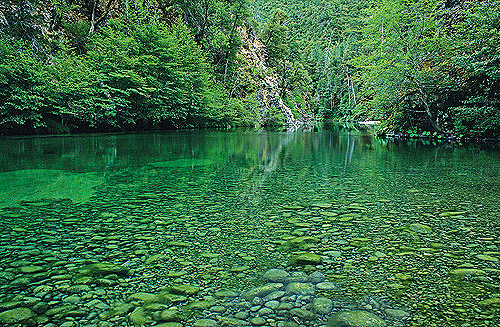 A long-simmering conflict over individual versus public rights has converged on the banks of the rivers of southwest Oregon, stirring resentment between gold miners and environmentalists. In question is whether suction dredging poses a threat to river wildlife and if the long-standing individual right to mine in the state should be amended.
A long-simmering conflict over individual versus public rights has converged on the banks of the rivers of southwest Oregon, stirring resentment between gold miners and environmentalists. In question is whether suction dredging poses a threat to river wildlife and if the long-standing individual right to mine in the state should be amended.
 |
The Chetco River is the site of a battle over gold dredging operations. // PHOTO COURTESY OF FRIENDS OF THE KALMIOPSOS |
A long-simmering conflict over individual versus public rights has converged on the banks of the rivers of southwest Oregon, stirring resentment between gold miners and environmentalists. In question is whether suction dredging poses a threat to river wildlife and if the long-standing individual right to mine in the state should be amended.
Suction dredging is a mining technique by which riverbed gravel is removed by a gas-powered machine, sifted for bits of gold, and released back into the river. Both sides cite conflicting evidence as to whether it is harmful to wildlife in river habitats. U.S. Forest Service geologist Greg Visconty, based in Portland, says the high price of gold (about $1,200 an ounce) in addition to a temporary ban on suction dredging in California is driving the increase in mining in the Rogue, Chetco and Illinois rivers. According to the Oregon Department of Environmental Quality, dredging permits in the state rose from 934 in 2009 to 1,205 this year.
The general mining act of 1872 establishes the individual right to mine. The anti-mining contingent is trying to protect the rivers by stopping further mining claims. The Forest Service, trying to accommodate both sides, has restricted dredging equipment size to reduce potential harm.
The most contentious point right now is how much mining can be done under current laws, which allow mining in wilderness areas if the claim was awarded before any wilderness protection. Most miners mine recreationally or for supplemental income. Robert Stumbo, owner of the Armadillo Mining Shop in Grants Pass, says most of his clientele are struggling to make ends meet in a county with high unemployment.
But Seattle developer David Rutan’s company, Chetco River Mining and Exploration, has bigger plans for its claims on the Chetco. Chetco River Mining has built a group of cabins on the Little Chetco River to attract prospector-tourists and proposes to commercially mine one of its claims in the Kalmiopsis wilderness area. Rutan’s plans have environmentalists up in arms. “He can’t do this legally,” Pete Frost of the Western Environmental Law Center of Eugene says of Rutan’s proposal.
“It’s not an antiquated law, it’s been updated several times,” Rutan says of the 1872 mining law’s legitimacy. “The law speaks for itself.”
The Forest Service currently is assessing Rutan’s claim in the Kalmiopsis. If the claim is deemed profitable and was filed before the Oregon Wilderness Act of 1984, Rutan will have the right to mine.
“Whether it takes five or 10 years, we’ll get it through,” Rutan says. “It’s immaterial how long it takes or how much it costs.”


